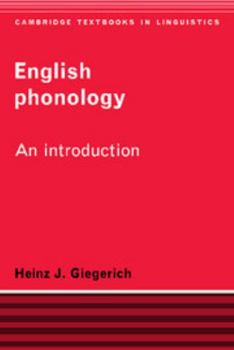English Phonology: An Introduction
(Part of the Cambridge Textbooks in Linguistics Series and Cambridge Textbooks in Linguistics Series)
Select Format
Select Condition 
Book Overview
This is an introduction to the phonology of present-day English. It deals principally with three varieties of English: General American, Southern British Received Pronunciation and Scottish Standard English. It offers a systematic and detailed discussion of the features shared by these major accents, and explains some major differences. Other varieties of English--Australian and New Zealand English, South African English and Hiberno-English--are also...
Format:Paperback
Language:English
ISBN:0521336031
ISBN13:9780521336031
Release Date:August 2008
Publisher:Cambridge University Press
Length:352 Pages
Weight:1.24 lbs.
Dimensions:0.8" x 6.1" x 9.0"
Related Subjects
Language ArtsCustomer Reviews
2 ratings
Excellent book
Published by Thriftbooks.com User , 18 years ago
This is an excellent introduction in English phonology. In keeping with its title, it does not pay attention to the theoretical difficulties that can occur studying languages other than English. Too bad it is out of print, though Mr Giegerich's website indicates that he works on a follow-up.
rigorous argumentation
Published by Thriftbooks.com User , 18 years ago
Giegerich's English Phonology is used as the textbook for the introductory phonology course in Applied Linguistics at Portland State University. The MA-TESOL diploma in this dept requires a course in "linguistic argumentation" and for that purpose this is a good book. Not easy to understand, and not a fast read, but beautifuly argued. We needed very little supplemental handout since G's argument is extremely detailed and disciplined. The argument's theoretical framework is essentially generative phonology, which claims that an adequate set of phonologically argued rules for a given language will produce all and only the correct expressions of that language. Three varieties of modern spoken English -- prestige Southern British "RP", middle-class Scottish English "SE", and midwest regional General American English "GA" -- are compared in great detail. In the first 130 pages, Giegerich develops a comprehensive feature set for English phonemes. In pages 130-330, he moves carefully stepwise from the phonemic basis into an argument for the structure of syllables, the metrical foot, and the metrical phrase in English. The argument itself is logically satisfying despite the proliferation of "exceptions" throughout. Exceptions are items that don't follow the rules. This is not a flaw from the educator's perspective. By paying close attention to each step as Giegerich lays out a long (330 pages) program of binary choices, the student observes phonological rule testing in action. When some items fail to pass the rules, we learn from the error. Professional phonologists will have heated opinions as to whether the presence of so many 'exceptions' invalidates the theory. However from the classroom perspective this is a good book from which to learn how to construct and test phonological rules. There is no mention in English Phonology of competing phonological theories or alternative representations such as Autosegmental Phonology or Optimality Theory. If the instructor wishes to introduce other theories, s/he might need additional texts.






